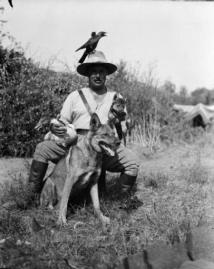 In 1915, Hugh Lofting started working for the British Ministry of Information, while still living in New York. I have not yet discovered what he did for them. In 1916 he left his wife and two small children (born 1913 and 1915) in New York, returned to England, and joined the Irish Guards, as a lieutenant.
In 1915, Hugh Lofting started working for the British Ministry of Information, while still living in New York. I have not yet discovered what he did for them. In 1916 he left his wife and two small children (born 1913 and 1915) in New York, returned to England, and joined the Irish Guards, as a lieutenant.
He served in Flanders and France from 1916 through to 1918; he was then wounded badly (a piece of grenade shrapnel in his thigh) and was invalided out.
I have not been able to find anything else out about his wartime service, yet, but I quote from an article he wrote for The Book of Junior Authors, in 1934 (2nd ed, New York H.W. Wilson, 1951, 198-99 (quoted by Schmidt, 6), which tells how Dr Doolittle came into existence.
It was during the Great War and my children at home wanted letters from me—and they wanted them with illustrations rather than without. There seemed very little of interest to write for youngsters from the Front: the news was either too horrible or too dull. And it was all censored. One thing, however, that kept forcing itself more and more on my attention was the very considerable part the animals were playing in the World War and that as time went on they, too, seemed to become Fatalists. They took their chances with the rest of us. But their fate was far different from the men’s, However seriously a soldier was wounded, his life was not despaired of; all the resources of a surgery highly developed by the way were brought to his aid. A seriously wounded horse was put out by a timely bullet.
This did not seem quite fair. If we made the animals take the same chances as we did ourselves, why did we not give them similar attention when wounded.? But obviously to develop a horse-surgery as that of our Casualty Clearing Stations would necessitate a knowledge of horse language.
That was the beginning of the idea: an eccentric country physician with a bent for natural history and a great love of pets, who finally has to give up his human practice for the more difficult, more since and, for him, more attractive therapy of the animal kingdom. He is challenged by the difficulty of the work—for obviously it required a much cleverer brain to become a good animal doctor (who must first acquire all amimal languages and physiologies) than it does to take care of the mere human hypochondriac.
This was a new plot for my narrative letter for the children. It delighted them.
The quotation is taken from Gary D. Schmidt, Hugh Lofting (New York: Twayne, 1992).
